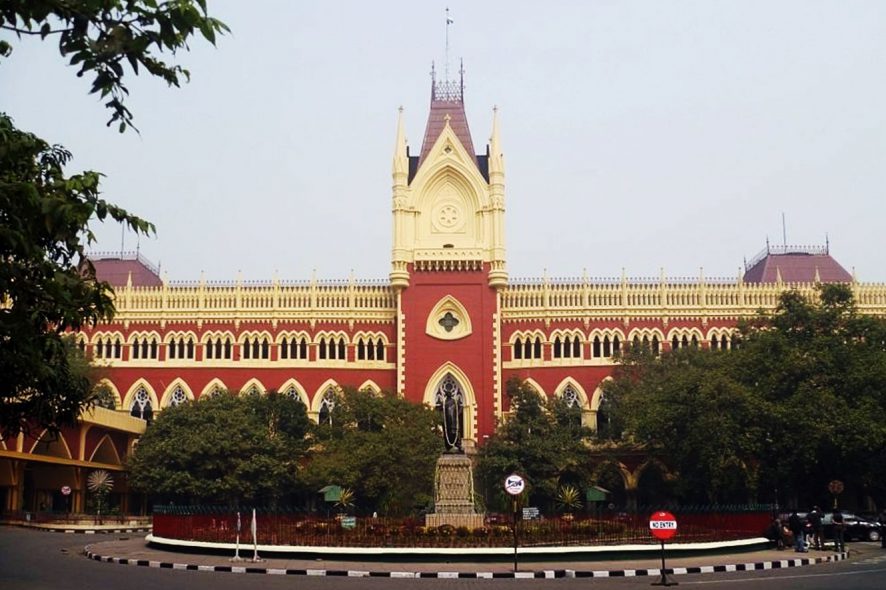Calcutta High Court: The Division Bench of Joymalya Bagchi and Ananya Bandyopadhyay, JJ. allowed an appeal which was directed against the judgment and order convicting the appellant for commission of offence punishable under Sections 302 of the Indian Penal Code and sentencing him to suffer rigorous imprisonment for life and to pay fine.
A 10 year old boy, had gone out to fly kite with his friends and didn’t return that evening, next day body of the boy was found lying in the canal. Two days later, father of the boy returned to his native village from his place of work at Mumbai and filed written complaint alleging his son had been murdered by an unknown person. Couple of days later, he made statement implicating the appellant who was the Moulabi of a nearby mosque. It was alleged that the appellant had illicit relationship with mother of the boy. The child had disclosed the illicit relationship to his father and accordingly appellant nursed a grudge against him. In course of investigation, a gunny bag and rope were recovered from an open spot near the mosque. Appellant absconded and was later arrested. In conclusion of trial the above mentioned punishment was granted.
Counsel appearing for the appellant submitted there was no direct evidence implicating the appellant in the crime. FIR was registered against unknown accused and motive to commit the crime had not been proved. There was no evidence on record that the child was last seen with the appellant prior to his death. Gunny bag and rope were recovered from an open space and did not implicate the appellant in any manner whatsoever. Appellant had gone to his native place in Bihar and was subsequently arrested and it cannot be said that he had absconded. He pleaded that mere abscondence does not establish guilt of an accused.
Counsels for the State argued appellant had strong motive to commit the crime as the child had seen the appellant and his mother Rasida in a compromising position.
The Court noted that the prosecution case is based on circumstantial evidence and there was no direct evidence that the appellant had murdered the victim. The court reminded that when case is based on circumstantial evidence it is the duty of the prosecution: –
(a) to prove all the circumstances relied upon against the appellant, beyond doubt;
(b) the circumstances so proved must form a complete chain which irresistibly points to the guilt of the accused and rules out all other possible hypothesis of innocence.
This Court had to identify whether the above requirement of law have been satisfied in the facts of the present case. The Court after perusing the evidence found that it cannot be said that the intimacy between appellant and her mother Rashida was divulged only by Farhad as uncle of Farhad, had also informed his brother about such relationship and thus it is difficult to understand why the appellant would nurse grudge against the minor son of his lover and not against other relations who had also informed the former about his illicit relationship. Hence, motive to commit the crime did not appear to be convincing.
Coming to the other circumstance, namely, recovery of gunny bag and rope from the backside of the mosque of the appellant, the Court noted that the articles were recovered from an open space which was accessible to all. Moreover, there was nothing on record to show that the gunny bag or rope so recovered were used to murder the victim or dispose of the body in the canal. No evidence was forthcoming that on the fateful evening or immediately prior to the death of the victim, appellant was last seen with the child.
Regarding the abscondence of the appellant immediately after the incident which is strongly relied on, the Court relied on the judgment of the Supreme court in Sk. Yusuf v. State of W.B., (2011) 11 SCC 754 where it was held that it settled law abscondence of an accused by itself does not establish his guilt.
“31. … It is a settled legal proposition that in case a person is absconding after commission of offence of which he may not even be the author, such a circumstance alone may not be enough to draw an adverse inference against him as it would go against the doctrine of innocence. It is quite possible that he may be running away merely on being suspected, out of fear of police arrest and harassment.”
Abscondence of the appellant when judged in the backdrop of the fact and circumstance of the case cannot by any stretch of imagination be treated to be conclusive evidence with regard to his guilt.
The Court was of the opinion that prosecution had failed to prove its case beyond reasonable doubt and the appellant was entitled to an order of acquittal. Appeal was allowed and conviction and sentence of the appellant was set aside.[Md. Firoz Ala v. State of West Bengal, C.R.A. 176 of 2019, decided on 18-05-2022]
For the Appellant : Mr Kallol Kumar Basu, Md. Jannat Ul Firdous, Ms Tithi Majumder
For the State : Mr Swapan Banerjee, Ms Purnima Ghosh







